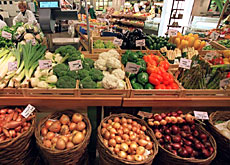Switzerland calls for more transparency on GM food

A government-appointed panel has called for more transparency in the food industry, saying consumers should be given a better choice between genetically modified and GM-free food.
On Monday, the Ethics Committee on Non-human Gene Technology argued that the current labelling on food was misleading.
The committee, which was appointed to advise the Swiss government on non-human biotechnology and gene technology, says all foodstuffs containing GM organisms should be clearly labelled, irrespective of the percentage of GM crops they contain.
Under the current law, food containing one per cent of GM organisms (GMOs) or less is not classified as such, a rule which the committee says deceives consumers.
Klaus Ripper, president of the Ethics Committee, believes that only foods that do not contain any GMOs should be classified as GM-free.
“I think [labelling] is a very important point,” Ripper told swissinfo. “We don’t think that our customers would [be happy] with the fact that one per cent of our food is [potentially] genetically modified.”
According to recent opinion polls, most Swiss consumers are against GM products.
Freedom of choice
The committee also emphasised that freedom of choice must be a priority and that no one should be forced to buy genetically modified food.
“One of the most important points is that consumers have the liberty to choose what they want to eat, especially those who are strongly opposed to GM foods,” Ripper continued. “Everybody should have the opportunity to buy other food.”
Scientists are still uncertain as to whether GM food poses any health risks and most of the committee’s members agree that more research needs to be done to find out more about the safety of GM foodstuffs.
Martine Jotterand, a member of the committee, also called for research to be carried out on other types of food that could be harmful.
“We have paid tremendous attention to GMOs, but it is also important to consider other types of food that have not been studied so thoroughly,” Jotterand told swissinfo.
Cross-fertilisation
Earlier this month, the Swiss parliament gave the green light to a new law regulating the use of GM crops in food production, in a bid to protect non-GM farmers and consumers.
The new law allows for GMOs to be planted, while at the same time protecting non-GM crops from cross-fertilisation.
However, critics argue that it is almost impossible to prevent cross-fertilisation once GMOs are planted.
Marianne Künzle of Greenpeace welcomed the decision that GMOs should be tightly regulated, but expressed doubts as to its effectiveness.
“I am not sure that [non-fertilisation] this can be guaranteed in such a small country like Switzerland. I believe there will be problems,” she said.
Import only
While a number of GM crops can be used as foodstuffs and animal feed in Switzerland, they are not allowed to be cultivated.
“Roundup Ready” soya, “Mon810” and “MaisGard” maize from the United States bio-technology giant, Monsanto are permitted, as well as “Bt11”, “Bt176” and “Maximizer” maize from the Swiss pharmaceutical giant, Novartis.
According to the committee’s brochure, Roundup Ready soya is used as a weed killer, whereas whole soya, processed soya and associated soya products are found in a wide range of foods, such as muesli and soya oil.
swissinfo, Billi Bierling and Faryal Mirza
Food containing 1% or less of GM crops does not have to be classified as GM-food.
Certain GM-crops such as “Roundup Ready” soya and “MaisGard” maize are available in Switzerland, but are not allowed to be cultivated.
The Ethics Committee was appointed in 1998 to advise the authorities in the field of non-human biotechnology and gene technology.

In compliance with the JTI standards
More: SWI swissinfo.ch certified by the Journalism Trust Initiative










You can find an overview of ongoing debates with our journalists here . Please join us!
If you want to start a conversation about a topic raised in this article or want to report factual errors, email us at english@swissinfo.ch.